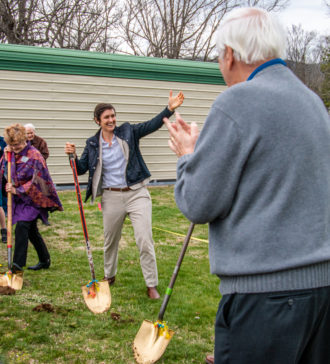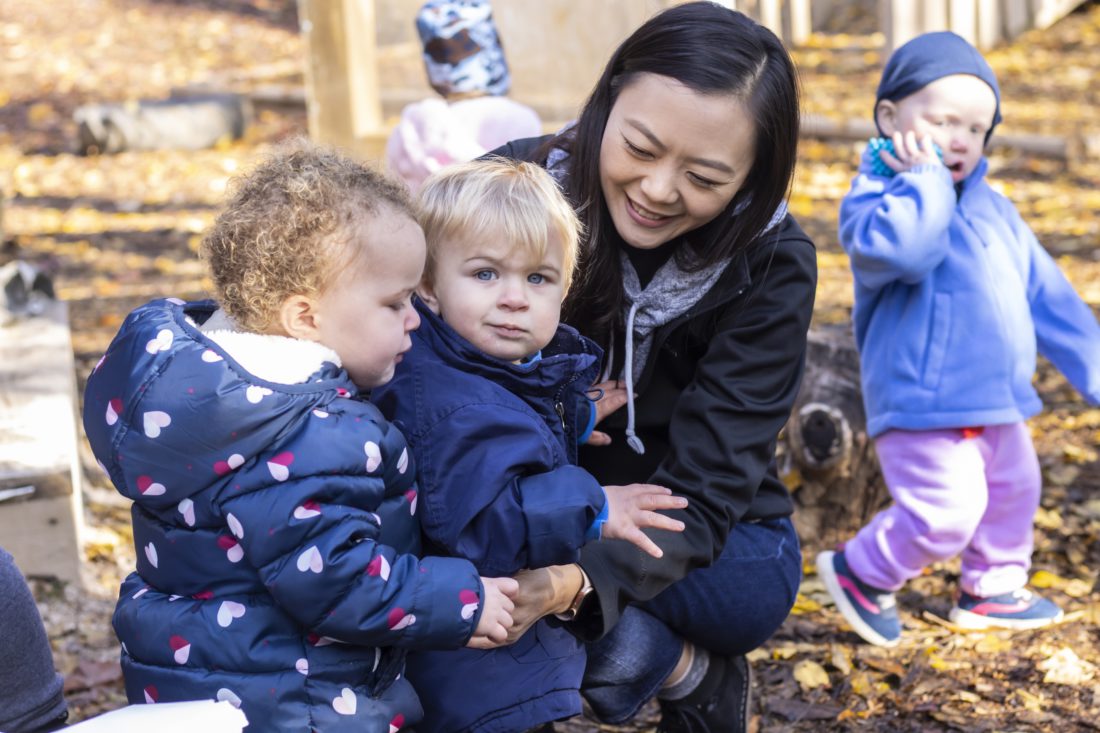Marcia Whitney has some stark advice for parents hoping to enroll their children in her organization’s child care programs.
“We recommend that people get on a waitlist before they get pregnant, and I’m only partly joking,” says Whitney, who is president and CEO of the Verner Center for Early Learning. “We really do.”
Between the Asheville-based nonprofit’s three child care centers, a program based at the Asheville YWCA and the home-based Early Head Start, she says, the organization serves over 300 local children per year. Meanwhile, its waitlist is approximately 600 children long.
Just about every child care provider in the county faces similar disparities, says Buncombe County Commissioner Jasmine Beach-Ferrara. That’s one of the reasons she and her colleagues allocated $3.6 million for the county’s Early Childhood Education and Development Fund last June as part of the fiscal year 2019-20 budget, a $1.9 million increase from the previous year. With Buncombe now more than halfway through year one of that commitment, Beach-Ferrara, who chairs the committee that oversees the fund, says the initial investment is already paying dividends. “Many of the projects that we funded in this first cycle are hitting their goals and strides, and that’s exciting,” she says.
Xpress followed up with the organizations behind several of these projects to learn more about their work. All expressed optimism about the additional support, mixed with concern about still-unmet community needs.
Bricks and bodies
The most obvious signs of progress are several new child care facilities that have already opened or are in the works. On Feb. 12, North Buncombe High School opened a new preschool classroom supported by a $400,000 county grant, while on March 4, the Donald S. Collins Early Learning Center in Black Mountain broke ground on a new $1.4 million facility for which the county contributed $200,000 in 2018.

Formerly known as the Children and Friends Enrichment Center before its recent renaming in honor of Black Mountain Mayor Don Collins, the facility is a project of the Swannanoa Valley Child Care Council. Linda Hobson, the council’s board chair, expects the center’s 12 new modular units to be installed by the end of May. They’ll accommodate 100 additional children, up from a current capacity of about 70. She believes the opening will send “a ripple through the valley,” making it easier for parents to take jobs while ensuring that their kids are better prepared to enter kindergarten.
But buildings alone don’t teach children, notes Amy Barry, executive director of the Buncombe Partnership for Children. At the root of the county’s child care woes, she says, is a lack of qualified early childhood educators to staff those classrooms.
“We can’t expand even if we had a ton of money, because we have a workforce shortage,” Barry explains. “There’s some high turnover in existing programs, some program closures and an inability to expand without that workforce.”
Several of the county’s grants aim to both expand physical capacity and address the staffing shortfall. The North Buncombe classroom will enable up to 10 students in the school’s career and technical education program to get hands-on experience that will complement what they’re learning in class, and a $25,000 award to the Buncombe Partnership for Children aims to recruit and train community members who can provide licensed child care out of their homes.
In cases where only capital funding is provided, however, programs must do their own recruiting. Hobson says her center will more than double its staff, going from 15 to 32; to encourage new applicants, her board plans to raise salaries and collaborate with other providers to offer better health care benefits. Budgetary constraints still apply, however, and the facility must also consider its clients’ needs.
“Someone paying full tuition for a child year-round would already pay as much as they would for a year at A-B Tech. It’s very expensive to provide care, and there’s a limit to how much working families are able to pay,” notes Hobson. “Our mission, since our founding by the Church Women United in Swannanoa 41 years ago, has been to serve working families.”
More funding needed
The Buncombe County grants, Beach-Ferrara concedes, are really only a first step aimed at getting projects started and attracting other financial support.
“What we know is required,” she says, is “a braided funding strategy that includes county funding, other forms of public funding, foundation funding and private business support. That’s really how we will ultimately scale this system up.”
That strategy has shown some early signs of success. Hobson, for example, was able to combine the county’s initial $200,000 award with $250,000 from the WNC Bridge Foundation, more than 50 individual gifts ranging from $10 to $30,000, and other contributions to help pay for her new facility’s construction. Barry, meanwhile, says that county support for the Buncombe Partnership’s Early Childhood Teacher Workforce Development Program encouraged Gov. Roy Cooper to provide an additional $400,000 through the NCWorks Local Innovation Fund.
And Whitney of Verner Early Learning says that a $500,000 county award for her nonprofit’s partnership with Emma Elementary School helped attract an additional $750,000 from The Glass Foundation in Asheville. “The fact that Buncombe County, with the Early Childhood Education and Development Fund, saw the importance of investing in this project gave additional confidence to the family foundation to invest in it,” she explains.
Yet with a projected total cost of $2.6 million, the Emma project still needs considerably more funding before it can even break ground, notes Whitney; to that end, she’s submitted another grant application for the county’s fiscal year 2020-21 funding cycle. “Buncombe County’s first grant definitely did help to leverage this private foundation support, and hopefully, that private foundation support will also resonate with Buncombe County,” she says.
Dollars and sense
Even as funding begins to coalesce around early childhood projects throughout the county, however, Barry stresses that existing commitments are inadequate to address what she says is a crisis in services for Buncombe’s youngest kids.
“It’s a really great start, but it’s not enough. We feel like it’s going to take some greater investments from the county, the local business community and the state in order to really address the need.”
Whitney agrees. Governments and other institutions already provide massive support for the K-12 educational system, she points out, but 90% of brain growth occurs before a child even enters kindergarten. “If there was the same level of investment in early education that there is in K-12, then we probably wouldn’t be having this conversation,” she maintains.
According to the 2018 resolution that established Buncombe’s early childhood fund, county support for high-quality preschool and pre-K is projected to grow by 2% annually. That would mean an additional $72,000 in the budget for the 2020-21 fiscal year, which begins July 1.
Beach-Ferrara does not expect the county to deviate from that plan. Consistent government support, she believes, is critical to providing essential services that deliver a “tremendous return on investment” both for children and for society at large.
“Private companies need to be part of the solution, but the government also needs to be part of the solution,” she says. “Our job is to think about every single child in Buncombe County, regardless of ability to pay.”





Before you comment
The comments section is here to provide a platform for civil dialogue on the issues we face together as a local community. Xpress is committed to offering this platform for all voices, but when the tone of the discussion gets nasty or strays off topic, we believe many people choose not to participate. Xpress editors are determined to moderate comments to ensure a constructive interchange is maintained. All comments judged not to be in keeping with the spirit of civil discourse will be removed and repeat violators will be banned. See here for our terms of service. Thank you for being part of this effort to promote respectful discussion.